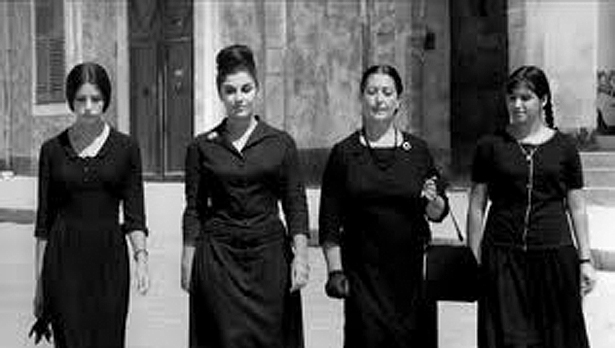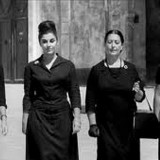When you think about what makes a film a masterpiece, beyond the usual suspects like clever script, believable acting or memorable soundtrack – what I believe worked extremely well for post-war Italian cinema is the historical context. For the neorealism genre it supplied ample stories of hardships told by non-professional actors in actual locations with uncompromised honesty.

The keepers of the family precious honor – strolling
This film, which is part of the Italian Comedy genre (commedia all’italiana), a term coined after Pietro Germi’s two years earlier gem – Divorce Italian Style – Divorzio all’italana, also benefited from three “historical constraints.” The first, the absence of divorce laws in Italy, which arrived only ten years later with a 60-40 majority vote; the second, an ancient Italian statue that absolved a rapist if he marries his victim; and third, the importance of protecting the family honor no matter what in a fairly conservative Sicilian society of early 60’s.
These opposing constraints produced colossal “plot fireworks” when Germi threw in the sordid event of a sixteen years old girl that was “seduced and abandoned” – most likely inspired by a jargon title used in similar news stories at the time.
Germi utilizes these solid foundations to ironically criticize the social, religious and political conditions of a society undergoing massive changes during Italy’s Economic Boom (aka Boom economico) of early 60’s. Against the backdrop of economic growth and prosperity of the north, Sicily is portrayed as a backwards society with its own rules and social mechanics designed to protect the family honor.
Germi intentionally creates his characters as grotesque, at times violent, delivering double standards to produce the genre’s core formula: comedy mixed with bitter criticism of real social problems. From this angle you can trace down the origin of Italian comedy emanating from Neorealism documentary roots, evidenced even with a simple close-up study of locals’ authentic faces gathering in the piazza.
The film brings together an amazing cast with some of the main characters leveraging their Sicilian roots: the volcanic performance of Don Vincenzo Ascalone played by Saro Urzì who was born in Catania, the sissy brother Antonio Ascalone – (Lando Buzzanca) and the scoundrel Peppino Califano (Aldo Puglisi) – both actors born in Palermo.
And beautiful Stefania Sandrelli plays Agnese Ascalone as the innocent girl turned hysterical due to her placement right in the eye of the storm threatening the family honor. From this perspective, honor is perhaps the most important character of the film. Ever so fragile, underscoring the clear boundaries between the public space presented by the fake shows Don Vincenzo occasionally “broadcasts” to his neighbors, vs. the private space – inside their home where he let loose all his rage. Always shutting doors first to make sure the dirty laundry is only washed in complete privacy.
The film was shot in quaint town of Sciacca on the southwestern coast of Sicily, where its white alleys perfectly extenuated the actors’ black costumes. This binary color template works as another ironic layer since the reality presented is far from black and white carrying many shades of grays.
One of the film’s funniest quotes that reveals the absurd logic Germi uses to eloquently criticize social mores, comes from Peppino Califano who even though committed the sin, doesn’t want to marry Agnese because she’s not virgin and his rationale is:
“It’s a man’s right to ask and a woman duty to refuse.”
And just so you don’t get the wrong impression, Italian society has dramatically changed since this film was released in 1964. According to the most recent statistics done in 2008, more than 84,000 out of Italy’s 60 million residents were separated and 54,000 divorced with a 4% increase annually. It used to be 12,000 thirty years ago. Part of the reason is economical as divorce cost became more affordable and changes in social dynamics, judging by a recent divorce fair held in Milan to address the needs of this growing cottage industry.

